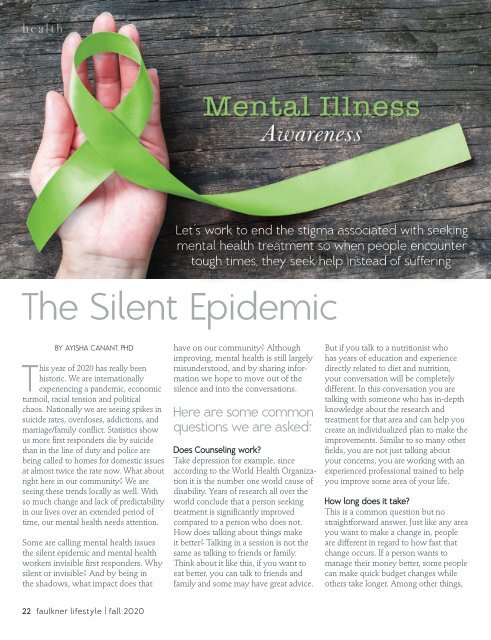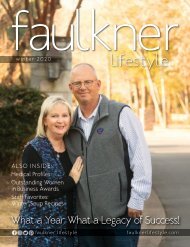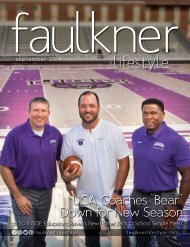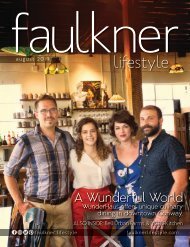Fall 2020 Faulkner Lifestyle
We hope you enjoy our largest issue to date! www.faulknerlifestyle.com
We hope you enjoy our largest issue to date!
www.faulknerlifestyle.com
- No tags were found...
You also want an ePaper? Increase the reach of your titles
YUMPU automatically turns print PDFs into web optimized ePapers that Google loves.
health<br />
Let‘s work to end the stigma associated with seeking<br />
mental health treatment so when people encounter<br />
tough times, they seek help instead of suffering.<br />
The Silent Epidemic<br />
BY AYISHA CANANT, PHD<br />
This year of <strong>2020</strong> has really been<br />
historic. We are internationally<br />
experiencing a pandemic, economic<br />
turmoil, racial tension and political<br />
chaos. Nationally we are seeing spikes in<br />
suicide rates, overdoses, addictions, and<br />
marriage/family conflict. Statistics show<br />
us more first responders die by suicide<br />
than in the line of duty and police are<br />
being called to homes for domestic issues<br />
at almost twice the rate now. What about<br />
right here in our community? We are<br />
seeing these trends locally as well. With<br />
so much change and lack of predictability<br />
in our lives over an extended period of<br />
time, our mental health needs attention.<br />
Some are calling mental health issues<br />
the silent epidemic and mental health<br />
workers invisible first responders. Why<br />
silent or invisible? And by being in<br />
the shadows, what impact does that<br />
have on our community? Although<br />
improving, mental health is still largely<br />
misunderstood, and by sharing information<br />
we hope to move out of the<br />
silence and into the conversations.<br />
Here are some common<br />
questions we are asked:<br />
Does Counseling work?<br />
Take depression for example, since<br />
according to the World Health Organization<br />
it is the number one world cause of<br />
disability. Years of research all over the<br />
world conclude that a person seeking<br />
treatment is significantly improved<br />
compared to a person who does not.<br />
How does talking about things make<br />
it better? Talking in a session is not the<br />
same as talking to friends or family.<br />
Think about it like this, if you want to<br />
eat better, you can talk to friends and<br />
family and some may have great advice.<br />
But if you talk to a nutritionist who<br />
has years of education and experience<br />
directly related to diet and nutrition,<br />
your conversation will be completely<br />
different. In this conversation you are<br />
talking with someone who has in-depth<br />
knowledge about the research and<br />
treatment for that area and can help you<br />
create an individualized plan to make the<br />
improvements. Similar to so many other<br />
fields, you are not just talking about<br />
your concerns, you are working with an<br />
experienced professional trained to help<br />
you improve some area of your life.<br />
How long does it take?<br />
This is a common question but no<br />
straightforward answer. Just like any area<br />
you want to make a change in, people<br />
are different in regard to how fast that<br />
change occurs. If a person wants to<br />
manage their money better, some people<br />
can make quick budget changes while<br />
others take longer. Among other things,<br />
22 faulkner lifestyle | fall <strong>2020</strong>
















